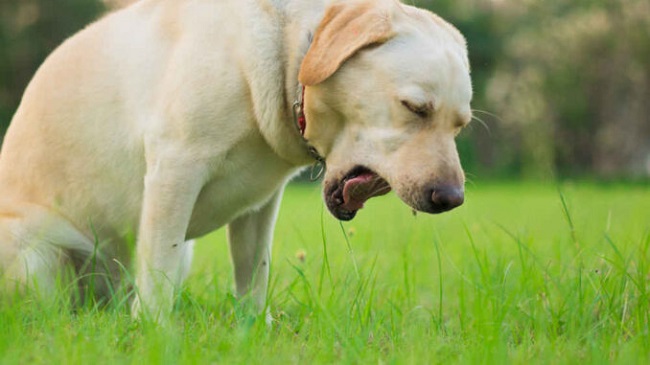For many pet owners, a ‘Dog Threw Up in The Morning’ scenario can be an alarming start to the day. Although occasional vomiting can be normal for dogs, frequent or unexplained incidents can indicate a more serious issue.
This article dives into possible reasons why your dog may vomit in the morning, preventive measures, and when it’s time to call the vet.

Common Reasons Why Your Dog Threw Up in The Morning
Unraveling the cause of your dog’s morning sickness can help you determine whether it’s a simple upset stomach or a sign of something more serious.
Eating Too Quickly
If your dog has a habit of gobbling down their food, they may end up vomiting due to an overfilled stomach or excessive air intake.
Dietary Changes
Sudden changes in your dog’s diet can lead to digestive upset, resulting in vomiting.
Eating Indigestible Material
If your dog ingests indigestible items like grass or trash, they may vomit in an attempt to expel the foreign material.
Gastrointestinal Disorders
Conditions such as gastritis, pancreatitis, or inflammatory bowel disease can cause chronic vomiting.
Morning Sickness in Pregnant Dogs
Similar to humans, pregnant dogs can experience morning sickness, leading to vomiting.
Prevention and Care for Morning Vomiting in Dogs
Here are some tips to prevent and manage your dog’s morning vomiting:
Maintain a Consistent Diet
Abrupt dietary changes can upset your dog’s stomach. If you must change your dog’s diet, do so gradually.
Encourage Slow Eating
If your dog tends to eat too quickly, consider using a slow feeder bowl or puzzle toys to slow them down and prevent digestive issues.
Regular Exercise
Regular exercise can aid digestion and prevent obesity, which can contribute to gastrointestinal issues.
Routine Veterinary Check-ups
Regular vet check-ups can catch potential health issues early before they become serious.
When to Seek Veterinary Assistance
While occasional vomiting may not be a cause for concern, certain signs should prompt immediate veterinary attention:
Persistent Vomiting
If your dog can’t keep anything down and continues to vomit, seek veterinary help immediately.
Additional Symptoms
If vomiting is accompanied by other symptoms like lethargy, diarrhea, loss of appetite, or changes in behavior, it’s time to visit the vet.
Dehydration
Vomiting can quickly lead to dehydration, which can be life-threatening. If your dog shows signs of dehydration such as dry gums, sunken eyes, or lethargy, seek immediate veterinary care.
Importance of Hydration After Vomiting
When your dog vomits, it’s crucial to ensure they stay well-hydrated to prevent dehydration. Here’s what you need to know:
Monitor Fluid Intake
After your ‘Dog Threw Up in The Morning’, make sure they have access to clean, fresh water throughout the day. However, don’t let them drink excessively immediately after vomiting, as this might upset the stomach more. Instead, offer small amounts of water frequently.
Electrolyte Solutions
In some cases, especially after multiple vomiting incidents, a vet may recommend an electrolyte solution to replace the minerals lost through vomiting. Always consult with your vet before giving your dog an electrolyte solution.
Signs of Dehydration
Keep a close eye on your pet for signs of dehydration such as dry gums, lethargy, or decreased urine output. If you suspect your dog is dehydrated, consult a vet immediately.
Keeping your dog hydrated after a vomiting episode can speed up their recovery and prevent potential complications. However, remember to consult a vet if you’re unsure or if your dog shows no improvement.
Conclusion
In conclusion, while it can be distressing to find that your ‘Dog Threw Up in The Morning’, understanding the potential reasons can provide some peace of mind and guide you on the next steps to take.
While preventative measures can minimize instances of morning vomiting, don’t hesitate to seek professional help if the vomiting persists or is accompanied by other worrying symptoms.
Remember, when it comes to your furry friend’s health, it’s always better to be safe than sorry.
























